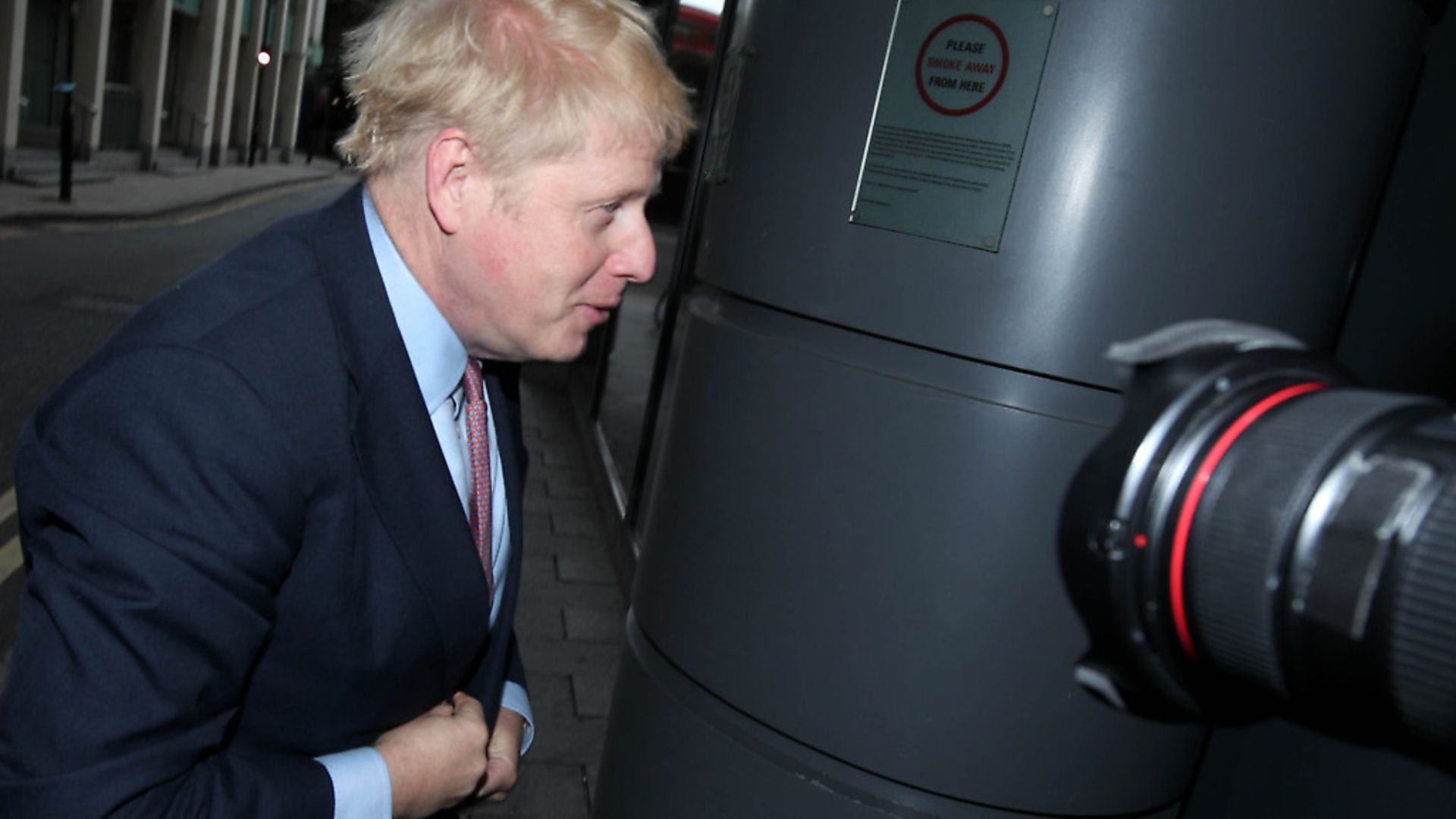
Fleet Street veteran Liz Gerard on why the broadsheet’s uncritical coverage of its star writer and Tory leadership frontrunner is a failure of the press
“Boris: I won’t bottle Brexit,” proclaimed the Daily Telegraph splash.
For the third successive Monday, the Tory favourite had given the paper double value with both a column and the main story.
Last week it was “Boris: fast internet for every home by 2025” and the week before “Johnson to cut income tax bill for millions”.
Note the definite nature of that headline. Forget the current leadership contest, forget parliament, forget that he might have to fight a general election. It’s all a foregone conclusion. He will become prime minister and he will cut some people’s tax bills.
The Telegraph nailed its colours to the masthead with that triumphant “He’s back!” puff last summer when his resignation over the Chequers deal freed up his pen for more lucrative tasks than signing government papers. Since then we’ve had “Time to believe in our great Britain”, “My plan for a better Brexit” and “Let my people go” among a dozen lead stories based on his Monday column.
As a member of the government, Johnson had to give up his weekly berth at the Telegraph, but there seems to be no brake on such activities as a potential prime minister. In most elections, candidates’ spending on campaigning is limited and monitored; here the candidate is paid £5,000 a time to spread his message directly to the tiny, ultra-niche electorate. Hand that man a megaphone.
This week’s message was that we “must” and “will” leave the EU on October 31 and that then all will be wonderful: children will have a better education, poor areas will become richer, everywhere will have fibre broadband, public transport will be cheap and reliable, taxes will be cut, and people will trust politicians again. How? He wasn’t telling. The whole effort was as vacuous as it was blatant electioneering, a string of cliches and soundbites that could have been notes for a speech jotted down on a day packet in the back of a taxi. This was far from vintage Boris wordsmithery.
The 10-paragraph splash focused on the leaving date, took a passing swipe at leadership rival Jeremy Hunt and squeezed in two sentences on the Boris story everyone else was most interested in: the shouting match with his girlfriend that prompted neighbours to call the police.
To be fair to the Telegraph, it led on the row on Saturday, in common with every other paper – apart from Daily Star, which preferred the “terrified” pensioners claiming “Seagulls held us hostage for six days”.
It was by any measure a terrific story (Johnson, not the gulls), both interesting to the public and in the public interest. Neighbours reported hearing a woman screaming “Get off me!” and “Get out of my flat!” at the man who would be our prime minister. One said: “It was a proper tear-up, glasses being smashed, screaming and a lot of arguing. I thought someone was being murdered.”
But even before the papers had hit the streets, Johnson had become the victim. Allison Pearson, a fellow Telegraph writer whose latest column had been headlined “There’s only one man for the job: Prime Minister Johnson”, tweeted that the neighbours who dialled 999 should be “named and shamed” because they had taped the argument and taken the recording to the Guardian.
It was a smear by a “creepy, sneaky politically motivated person”. Recording a lovers’ tiff through a wall was reminiscent of Honecker’s Stasi. Maybe we should record the neighbours’ unshouty lives and give it to a national paper.
After appearing on radio to defend her colleague, Pearson continued tweeting throughout the day, undeterred by those – including the police – who said it was vital that people report suspected domestic violence and that they should not be put off by threats of being identified.
A domestic row wasn’t a story, this was an hysterical attempt to “get Boris”, part of a witch-hunt by the left. There must be a law against taping private rows (that could be heard in the street), possibly harassment, possibly human rights, was there a lawyer who could advise?
Jay Rayner of the Guardian and David Aaronovitch of the Times broke cover to back the neighbours and the story and take Pearson to task. “When did you become this person, Allison?” Rayner wrote: “Because you seemed relatively sane when you were a sub-editor back in the day. Now you appear willing to say anything to defend a crass, racist, chaotic, shambling, lying, carnival huckster.” Sarah Vine (the Mail) and Carole Malone (Express) piled in to accuse Rayner (who had made no reference to gender) of misogyny. It all got very heated.
Meanwhile Toby Young agreed that the neighbours must be “of the left”, even as Mail on Sunday staff were preparing a spread on the ‘Guardianista Remain’ couple (“millionaire’s daughter who got funding for her pro-EU festival”) who had taped the row.
Young followed up on his tweets with a piece for the Telegraph asking “Must politicians be at the mercy of Britain’s pound-shop Stasi?” There would be terrifying implications if Watergate-style snoopers were celebrated in the media for recording politicians in the privacy of their homes.
Over at the Spectator arm of the Telegraph’s Team Boris, the magazine’s editor Fraser Nelson was tweeting Ross Clark’s Coffee House blog on the “hypocrisy” of the Guardian, which had exposed phone hacking, yet was happy to accept the Johnson tape – a point also made by Brendan O’Neill on his Spiked website.
The pro-Johnson argument ran that it was right for concerned neighbours to call the police, possibly even to record what they heard as potential evidence, but that taking the tape to a newspaper was wrong. The police had said all was OK, so there was no story.
Well, up to a point, Lord Copper. Every editor thought it worth the front page. Would any of them have turned the neighbours away if they’d knocked on the doors of their offices with the tape (whose contents the Guardian didn’t publish)? The Telegraph would possibly have suppressed the incident, as the Express might have done. But the Brexit-backing Mail and Sun would surely have grabbed the scoop with both hands.
Suppose it had been Corbyn? How concerned for his privacy would they have been? Would the Telegraph have said ‘no’ to an embarrassing tape?
And what about those lovey-dovey photographs of Johnson and Carrie Symonds in the “Sussex countryside” that surfaced on Monday? Was that intrusion – or a set- up? Were they even taken last weekend? Johnson’s hair seemed to have grown a lot in 48 hours.
The case certainly provoked a lively discussion about privacy (Pearson’s “lawyer” tweet elicited 3,000 replies), but what about the general issue of journalists calling politicians of all colours to account – especially one who is resisting scrutiny in television debates and is evasive in interviews?
Columnists are paid to have opinions, to be controversial (last weekend it seemed that Pearson was shooting for the Katie Hopkins crown), to spark debate. But are they and their publications supposed to be cheerleaders?
This newspaper is built on a single perspective: its title, self-description as being “for the 48%” and the page three “bollocks to Brexit” subscription ad all make that clear. The Telegraph still sells itself as “Britain’s best-selling quality newspaper”. That should mean it has a much broader agenda than a publication such as The New European.
All newspapers should be free to take a political stance and to campaign, but when it comes to Johnson, the Telegraph has turned into little more than a propaganda sheet and its columnists cheerleaders. In the past week we have seen Fraser Nelson going into bat for him against Martin Fletcher in a CNN discussion, Allison Pearson backing him in print, on radio and on Twitter, and Toby Young writing for the politics section of the website. Like-minded, maybe, but it does feel a bit orchestrated. So much so that some have suggested that the Telegraph is desperate to see PM Boris to save the £275,000 a year it pays him.
Telegraph writers are not alone, of course, in having their favourites. Columnists across Fleet Street have their pet subjects. Look at Janice Turner writing about trans issues in the Times; Leo McKinstry on immigration in the Express; Stephen Glover on the BBC in the Mail.
Others, at the Guardian, are staunchly pro-Jezza as Pearson and colleagues are pro-Bozza. Both sides seem to wear blinkers when it comes to their heroes’ faults. When legitimate questions are raised – across the spectrum, whether about screaming partners or Hamas – leaping to their defence and insisting ‘nothing to see here’ is not helpful. And it’s not journalism.










